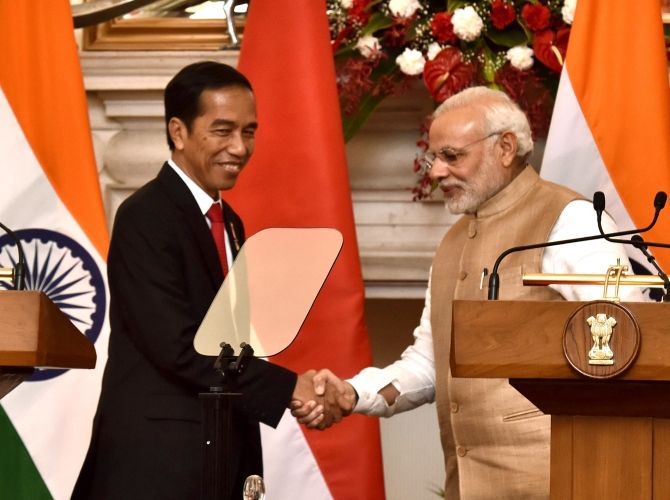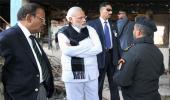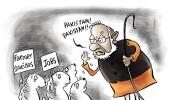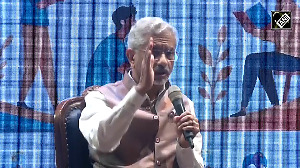'Joko's re-election bid has been as tough as Modi's.'
'But in a curious reversal of roles, what Joko faced was a platform somewhat akin to Modi has chosen for himself to woo voters,' notes Ambassador M K Bhadrakumar.

The reports from Jakarta indicate that incumbent President Joko Widodo has won the election on April 17 and secured another five-year term in office. Widodo draws comparison with Prime Minister Modi.
Both are charismatic figures. Both surged in national politics as rank 'outsiders'.
They assumed power in 2014 on a plank that was dominated by the development agenda and crusade against corruption. But Widodo had a harder time since he had no control over the Indonesian parliament, which is the key legislative body, whereas, Modi enjoyed an absolute parliamentary majority.
Widodo, therefore, needed to be extra sensitive to the people's mandate and that probably has made all the difference.
Widodo's re-election bid has been as tough as Modi's.
But in a curious reversal of roles, what Widodo faced was a platform somewhat akin to Modi has chosen for himself to woo voters.
Widodo's main challenger, former 3-star army general Prabowo Subianto, put up an Opposition political platform emphasising nationalism, muscularity in foreign policies and national security and appealing to hardline religious extremists.
Widodo's trump card, on the other hand, has been his strong economic performance, particularly delivering on infrastructure projects and a national health plan amongst other welfare programmes. It gave him a substantial edge over Subianto.
At the same time, Widodo countered the hardline Islamist stance of his opponent with a 'soft' Islamism approach by even choosing a conservative favourite among fundamentalist Muslims as his running mate.
It proved to be a brilliant strategy and as the campaign progressed, Subianto was increasingly put on the defensive, pleading that he had no intentions of imposing an Islamic State and even disclosing that his mother was actually a Christian.
Clearly, in the final analysis, living standards and pocketbook issues grabbed the voter attention.
Unsurprisingly, Widodo faced much criticism from his fiery nationalistic opponent over China's growing presence in Indonesia's economy. The Belt and Road Initiative projects became an election battle ground.
Indeed, Widodo has pushed Chinese investment to advance his multi-billion-dollar drive to build much-needed roads, airports and other infrastructure across the sprawling archipelago of more than 17,000 islands.
Widodo refused to be influenced by the campaign against Belt and Road by the US, India, Australia, etc. The fundamentals of the Indonesian economy are strong and the risk of a 'debt trap' doesn't exist.
Last year, China and Indonesia signed $23 billion in BRI contracts, including two hydro power plants on Borneo island and a power station on holiday hotspot Bali.
Chinese firms are already involved in several other ventures, including an industrial park on Sulawesi island and a $6 billion high-speed railway between the capital Jakarta and mountain-fringed Bandung city.
Subianto threatened to re-evaluate the BRI projects. However, it was mere rhetoric. The point is, the entire debate over Widodo's so-called 'pivot to China' is full of misleading claims. A tide of fake news online has been fanning anti-China sentiment. Who is orchestrating it remains unclear.
Like in India, popular perception in Indonesia regarding China's growing economic clout is ambivalent and a concerted attempt has been under way to fan anti-China, anti-BRI sentiment.
Fuelled by social media, one particularly widespread rumour concerns a perceived 'flood' of 10 million Chinese workers brought over from the mainland to construct the roads and mines that have attracted Chinese investment.
Other outlandish rumours on social media range from the Chinese government planting chilli seeds tainted with bacteria to a resemblance between Indonesia's new rupiah bills and China's yuan currency.
But in reality, most Chinese investment in Indonesia is in industry, such as mining, and there has been hardly anything by way of strategic or sensitive assets.
Again, the business deals involve mostly private-sector companies and China brought much-needed capital to build industrial processing plants such as the one in Sulawesi.
Now that the national elections are over, the current xenophobic rhetoric is likely to die down, if not disappear altogether.
The bottom line is that Widodo has won a handsome victory almost entirely on a platform of past five years's performance in advancing the country's economic dvelopment.
No doubt, he can claim a relatively solid economic record, with inflation at historically low levels and a slump in the rupiah currency coming off 2018 lows. Annual growth is hovering around 5 percent.
Perhaps, the infrastructure and social welfare programs are being implemented imperfectly, but there is popular recognition among Indonesians that Widodo is a practical and predictable politician and his development agenda is getting results.
To be sure, Widodo himself sees his development agenda as his true legacy.
Last month, amidst the election campaign, Finance Minister Sri Mulyani Indrawati presented to Widodo the macroeconomic and basic fiscal policies for 2020. She told the media that the issue discussed focused on human resources development, starting from education strategies, health, social safety nets to vocational programs for workers wanting to upgrade their skills.
The objective is to create more capable human resources to improve productivity through innovation with the final goal to increase the competitiveness of Indonesian products in the global market, Sri Mulyani added.
She said to improve competitiveness, the government would also find a way to encourage the manufacturing sector to help create a more balanced economic structure with the hope that it would help boost exports to ease the country's trade deficit.
To be sure, with the election behind him, Widodo will now proceed to realise his stated goal to transform Indonesia as an upper middle-income country. In the past 5 years in power, Widodo created 10 million new jobs.
Today, Indonesia's unemployment level is at an all-time low of 5.5 percent, inflation is at its lowest in a decade.
Widodo has vowed to create 100 million jobs over the next five years. Can he fulfil such a promise staggering in its proportions? Well, even if he half fulfils the promise, it makes a historic legacy for this former furniture exporter.
In fact, Widodo is already on the job.
AFP reported this week that the Indonesian government intends to offer $91 billion worth of projects -- from ports to power plants — to Chinese investors at the forthcoming summit of the BRI forum in Beijing on April 25-27.











 © 2025
© 2025